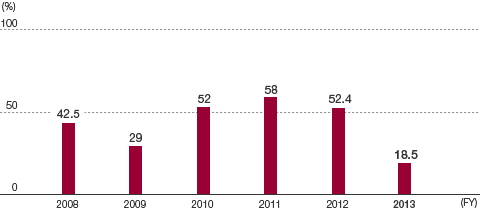 Accepting the Diversity
Accepting the Diversity

Diversity Management
Leveraging diversity in human resources management
Advantest accepts the diversity of its workforce and strives to create a workplace where every employee can achieve their potential and participate to the fullest. As stipulated in the Advantest Code of Conduct, we respect human rights and are determined to eliminate discrimination on the basis of race, creed, gender, nationality, religion, or physical disabilities.
Recruitment and use of global human resources
Advantest's business has become more global in recent years, and securing personnel who understand other cultures, have high-level communication skills, and can see business through on the global stage has become imperative for us. As the business environment becomes more borderless, we find it increasingly necessary to use personnel exchanges with overseas affiliates to promote globalism in our human resources development and corporate structure.
We are putting more effort into hiring foreign students both overseas and in Japan in order to secure employees who can fulfill missions on the global stage. We continue to conduct personnel exchanges with overseas affiliates as a way of giving employees business experience in a global environment. Through everyday business and training in both organizations, technology and knowhow are shared, allowing each employee to learn more advanced technology plus adaptive skills for a diverse business environment.
In 2013, planning to expand employment of foreign students, we participated in recruitment events aimed especially at such students at multiple locations in Japan and overseas (Singapore). Since most countries use a different school year from Japan's, we took a flexible approach to starting dates for foreign employees, thus easing one big stumbling block.
The human resources exchanges with overseas affiliates are implemented frequently at each division regardless of type of job. Under this program, which is specifically designed to promote interaction among personnel in Japan and abroad, employees participate in the exchange either on a short-term or long-term basis.
These activities enabled us to recruit students in overseas countries and foreign students studying in Japan. We now plan to extend the global reach of our recruitment activities going forward through further participation in similar job fairs, both overseas and in Japan. Although new employee training is generally geared toward new graduates who join the company in April, we are modifying this to allow all new graduates to take part in the training irrespective of when they start work.
As of March 2014, Advantest Corporation counted employees from 10 countries in its workforce, and six of the Company's 21 executive officers were non-Japanese. We will continue to provide equal opportunities to all promising individuals regardless of nationality while underscoring the need to develop global personnel and global organizations through borderless promotion and personnel exchange.
Appointment and use of female employees
We accept diverse values at all times, and we believe in the need for a corporate culture where employees can flourish regardless of their gender, age, or nationality. As of March 2014, however, women accounted for 13.6% of all Advantest employees and 1.7% of all managers, so we recognize a need to increase the recruitment of women.
Advantest hires a lot of new graduates in technical fields where male students are traditionally in a large majority. Conventional recruitment activity has not given women sufficient motivation to take our employment test. Mindful of this situation, we have stepped up our participation in a job fair for women and planned and held company tours to raise awareness of Advantest among prospective female recruits, specifically engineering students. At the job fair for women, we have met with a large number of students and explained Advantest's workplace environment, possible career paths, and various programs, highlighting the areas in which female employees currently excel.
As a result of these efforts, women accounted for 19% of new recruits in fiscal 2014. We will continue our efforts to increase this figure.
Number of new graduates hired (Advantest Corporation)
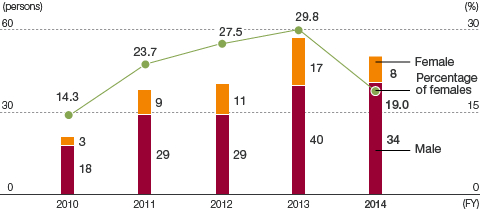
Supporting a Better Work-Life Balance
Ensuring a good work-life balance
The Advantest supports its employees in their pursuit of a good work-life balance based on Japan's Act on Advancement of Measures to Support Raising Next-Generation Children. We believe that the work-life balance concept will help make the company a comfortable place to work for all employees and ultimately contribute to increasing our corporate value. Therefore, we are taking measures to reduce overtime hours and create a work environment that facilitates a good work-life balance, allowing our employees to actively pursue outside interests and become well-rounded individuals.
The most important issue regarding work-life balance is the reduction of overtime hours. To address this issue, we set the goals specified below and then focused on increasing operational efficiency, encouraging a change in employee mindsets, and making the most of available work arrangements such as flextime and shift work.
Our overtime reduction goals are:
- Number of employees with monthly overtime of 80 hours or more: zero
- Average monthly overtime hours: 36 or fewer
We have also made start and finish times more flexible and introduced half-day leave slots to make it easier for employees with working spouses to adjust their work schedules so that they can better share household chores and responsibilities.
In fiscal 2013, the Company reduced maximum working hours under Japan's "Article 36 Agreement," pledged to deal seriously with overtime reduction for all employees, and reminded supervisors of their responsibility to ensure that employees do not work excessive hours. Since fiscal 2011, we have made announcements via the public address system urging employees to leave the office on time on Wednesday, and we have been notifying the immediate supervisors of employees found to be working excessive overtime (15 or more hours of overtime already clocked by the 15th of the month, or 70 or more hours by the 20th and 25th of the month, or three days of holiday worked already by the 20th and 25th). In the second half of fiscal 2013, we began issuing notices to supervisors when employees clocked five or more hours of overtime by the 10th of the month, or 10 or more hours by the 20th of the month, in an effort to further reduce overtime hours.
Although we were able to achieve our goal of fewer than 36 average monthly overtime hours as a result of these initiatives, we were not able to achieve our goal of zero employees working 80 or more monthly overtime hours. The reason was that we had to deal with unexpected problems and meet short lead times. Countermeasures to prevent recurrence were discussed at leader meetings.
We plan to work towards achieving the same goal in fiscal 2014.
We have completed some improvements with regard to the work-life balance issue, and will ensure that all employees are well aware of the new systems and work to improve them while monitoring how they are utilized.
In light of the recent nursing care situation, beginning in April 2013 we extended home healthcare leave and the period of reduced working hours for home healthcare from one year to three years.
No. of employees to whom childcare flexible start time arrangements applied
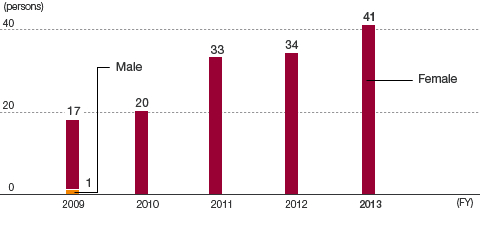
No. of employees taking home healthcare leave
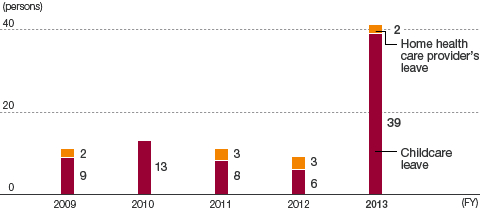
No. of employees who took cumulative paid leave
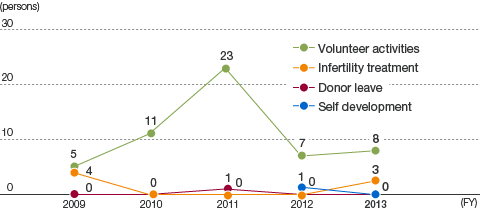
Supporting a better work-life balance
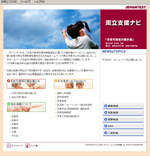
Work-Life Balance Support Guide
The Advantest Group supports the achievement of a good work-life balance by its employees based on Japan's Next Generation Education and Support Promotion Act. Advantest carries out various measures aimed at helping our employees to balance work with child-rearing while achieving their full individual potential.
Expectant mothers are eligible for paid leave to see their doctor or paid time off in case of a difficult pregnancy (both programs introduced in April 2007,) while employees with young children are entitled to childcare leave of up to two years (introduced in April 2001). Shortened working hours are also available for employees with children up to the third grade.
In 2007, we placed the Work-Life Balance Support Guide on the intranet to gain broader recognition of the various programs Advantest provides and encourage take-up. The guide also offers information on related services provided by local governments.
The number of employees on maternity leave as of the end of fiscal 2013 was 30.
No. of employees taking childcare leave
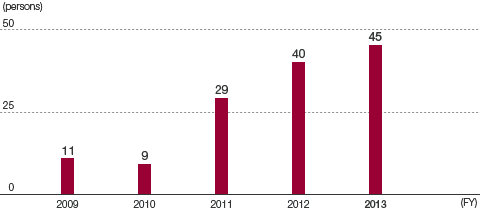
Reducing overtime hours
In November 2006 Advantest established the Working Hours Improvement Committee composed of company employees and labor union members for the purpose of reducing overtime hours. In addition, subcommittees set up in each division have studied the causes of overtime work and continued to conduct measures aimed at reducing overtime hours. As a result, the number of monthly overtime hours per employee did not exceed 20 hours in fiscal 2013.
Reduction of overtime hours per employee (Advantest Corporation)
